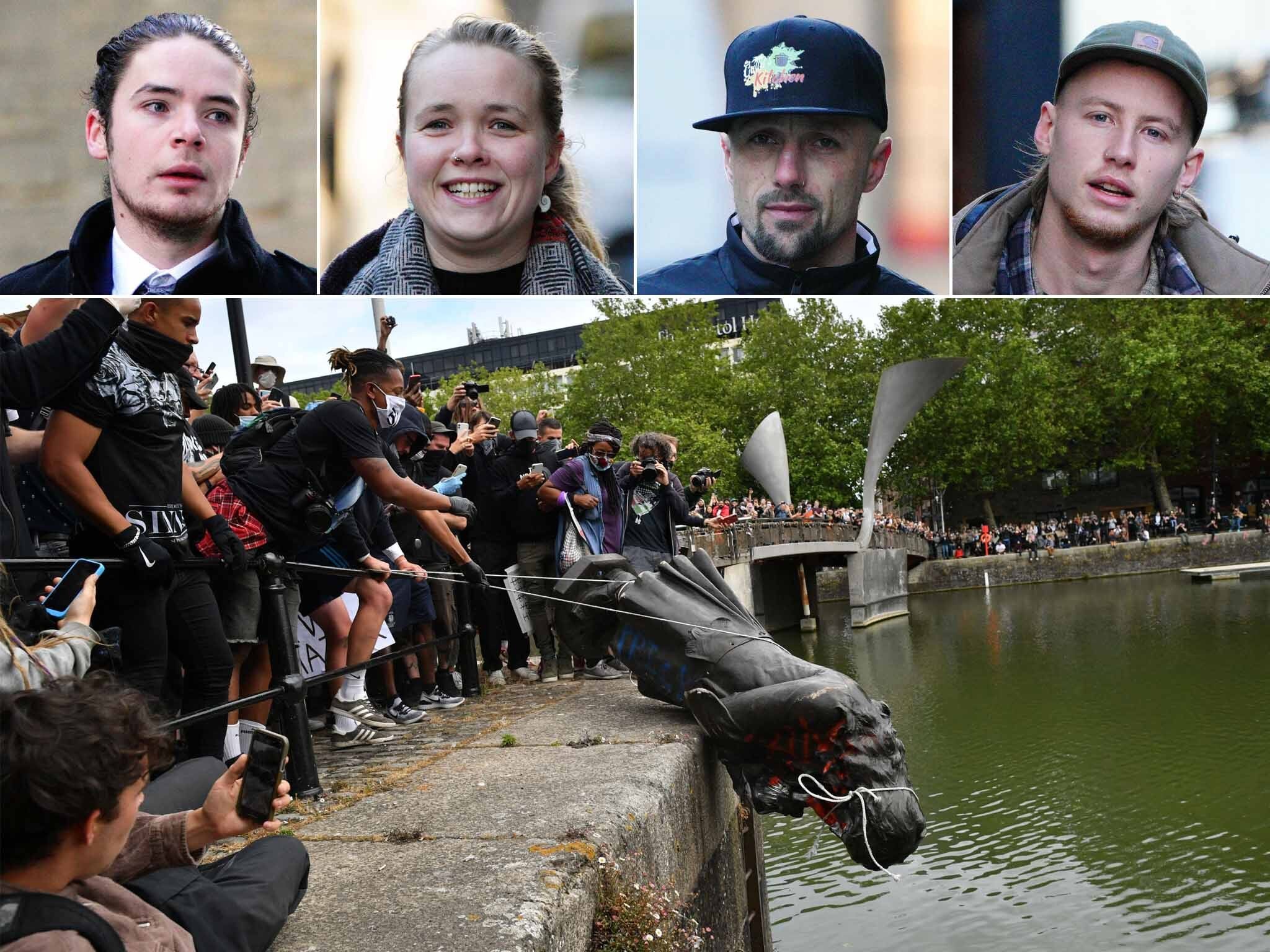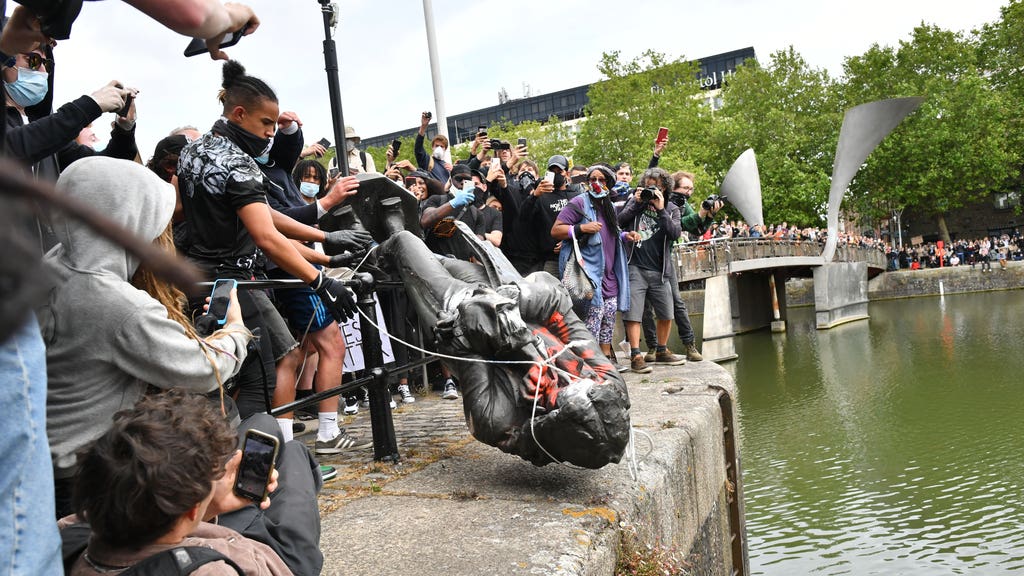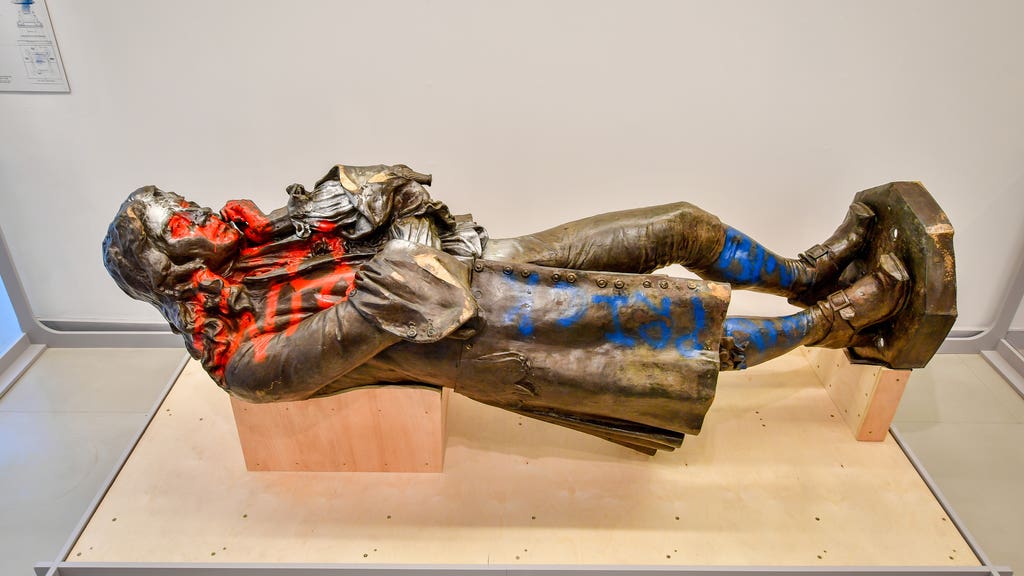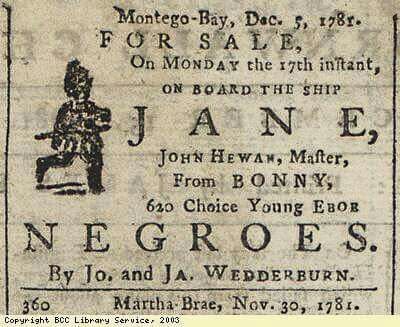I cheered when I heard that the ‘Colston Four’ had been acquitted – how could I not?
My ancestors were the Eboe people of Nigeria, many of whom ran away from their captors after they were stolen from the continent and brought to Jamaica, writes Nadine White


Your support helps us to tell the story
From reproductive rights to climate change to Big Tech, The Independent is on the ground when the story is developing. Whether it's investigating the financials of Elon Musk's pro-Trump PAC or producing our latest documentary, 'The A Word', which shines a light on the American women fighting for reproductive rights, we know how important it is to parse out the facts from the messaging.
At such a critical moment in US history, we need reporters on the ground. Your donation allows us to keep sending journalists to speak to both sides of the story.
The Independent is trusted by Americans across the entire political spectrum. And unlike many other quality news outlets, we choose not to lock Americans out of our reporting and analysis with paywalls. We believe quality journalism should be available to everyone, paid for by those who can afford it.
Your support makes all the difference.I cheered when I heard that the anti-racism campaigners arrested after the toppling of the statue of slave trader Edward Colston in Bristol – the ‘Colston Four’ – had been cleared of criminal damage. How could I not?
My ancestors were the Eboe – or Igbo – people of Nigeria, many of whom ran away from their captors after they were stolen from the continent and brought to Jamaica. When I reflect on their journeys and the brutality they endured, it fuels my resounding desire to see racial justice achieved.
Edward Colston was both racist and murderous – the fact that he was long-gifted with immortalisation through this statue is a stain on our society.
Campaigners had been lobbying for the removal of this statue since as far back as the 1920s. Over the years, various petitions were launched; there was even a relatively short-lived consultation regarding the erection of a plaque explaining the slaver’s true legacy of subjugation and bloodshed.
The plaque, perhaps needless to say, never came to fruition. Too uncomfortable of an undertaking, I expect.
As such, Colston’s presence – elevated to lofty heights on its cosy plinth while his victims were cast into the shadows – felt akin to a hate crime. I simply don’t see how there aren’t grounds for Bristol City Council to be investigated for its failure to safeguard the residents of its city.
Bristol Crown Court did arrive at the correct conclusion in the Colston case, but it is a shame that prosecution was brought in the first place at the expense of the taxpayer – that money could have gone towards slavery reparations, as far as I’m concerned.

Despite the fact that many people from within marginalised communities do not trust the criminal justice system, the outcome of the Colston Four trial has been widely lauded as a victory. Sure, people have speculated whether the same outcome would have transpired were the defendants Black, given how much we’re overrepresented in prisons; it’s a valid point to consider.
However, even if this is “white privilege” in action – reflecting the reality that white people are not criminalised at the rates which Black people are – on this occasion, such a benefit has arguably been used to right a wrong and so should be grounds for celebration all round.
I noted that during the trial, the defence largely relied upon four points: that the intention was not to damage the statue, but merely to remove it; that the statue is owned by the citizens of Bristol, so there’s a claim to it (and its fate) by those who live in the city; that the damage inflicted upon the memorial was “proportionate in relation to the prevention of crime” such as indecency – in that the statue is an indecent display of a colonialist which causes offence to many of the population of Bristol; and that removing the statue was tantamount to the prevention of the crime of “misconduct of public offence”, where calls to remove the statue were ignored by the council.
According to co-defendant Rhian Graham, an art valuer found that the Colston statue has actually increased in worth, post-toppling. Before it was pulled down, the monument was valued at £6,000, while it would now go for up to £300,000.
I’m deeply uncomfortable with this sense of profiteering – to me, this would suggest that the city of Bristol stands to benefit from the statue in a way that’s not dissimilar to how enslaved Black people were torn from their families and bought and sold at auction.
Who really loses out in this situation? It’s not the city, which gained £70,000 from Colston’s estate; or the plethora of commentators who are foaming at the mouth, disappointed that the Colston Four weren’t convicted.

No, it is the legions of Black people who are still forced to grapple with the legacy of colonialism on a daily basis; who are living in a society entrenched with racism, alongside many more commemorations to the British empire.
It’s these same people, having been hurt by the statue’s existence, who are being gaslighted by commentators who ask glib questions such as, “Oh, where will it end?”
I’ll tell you how this story ends: the Colston statue is in storage, having rested on display in the M Shed museum (reclining, if you please), while Black people still don’t have the luxury of relaxing. We are too busy in the continuous fight for our lives and liberty.
Speaking on Good Morning Britain this morning, the right-wing commentator Calvin Robinson dismissed the brutal legacy of Colston, like so many across this country do: “Edward Colston had a very wicked past; he made his money in evil ways – but he did also put his money to good use in setting up old houses, charities and schools, so there’s a balance to be addressed.”
If Jeffrey Epstein and Ghislaine Maxwell opened shelters for sexual abuse victims, would that absolve them of their crimes? If Hitler financed counselling for Holocaust survivors, would that justify a bronze memorial of the dictator being pushed down their throats each day?
And if it’s history that Colston’s defenders want to talk about, then let’s talk about history: having been born into a wealthy merchant’s family, Colston rose to become a chief executive in the Royal African Company, which held a monopoly over the slave trade for a large part of the 17th century. He was directly involved in the trafficking and enslavement of tens of thousands of African people, including children, between 1680 and 1692. Many Black people resided in the city of Bristol.
Young people were snatched from villages in Africa for enslavement, while those deemed of little worth – such as babies and the elderly – would be butchered in front of them as part of the “seasoning” process of psychologically and spiritually destroying captives. Many would be branded with a hot iron before being packed in and chained to the decks of the ships bound for the Caribbean.
At one point, Bristol was Britain’s largest slaving city, accounting for 20 per cent of the trade, and was involved in the transportation of more than half a million people – more than its current population.
Owners had the right to torture and kill slaves who tried to rebel, and the bodies of those killed were often nailed to posts around plantations as a warning to others. Slave-owning in British colonies was not abolished until 1834.
The British government raised a huge sum, £2m, through bonds to compensate slave owners for their loss – the inconvenience of not owning Black people to make them rich.
This held the record for the largest ever government bailout of an industry until the bailout of the banks during the financial crisis of 2008 and 2009; through the payment of taxes, many of us – including descendants of those enslaved – unwittingly financially contributed to the payment of that debt which was paid off in 2015. Let that sink in.
The very least that Black people are owed is the right to not be confronted by slaver statues and colonial relics, which serve as reminders of what our families endured and continue to as a result of broken families, interrupted histories and intergenerational socioeconomic deprivation.

Black people today still live with the legacy of the actions of people like Colston. Yet despite being instrumental in atrocities against so many Black families, Colston was able to successfully rebrand during his lifetime, donating huge amounts of money to charitable causes in Bristol.
Following his death, a “cult of Colston” sprouted in the city – which saw statues erected, and societies, schools and streets named after him (some of which were renamed after the death of George Floyd and the resurgence of the Black Lives Matter movement).
To keep up to speed with all the latest opinions and comment sign up to our free weekly Voices Dispatches newsletter by clicking here
Renaming or no renaming, some of us will never forget the truth – least of all people who, like me, are descendants of enslaved African people.
I can’t forget the grim statistics: such as the fact that at least 19,000 Black people died on ships bound for the Caribbean and the Americas. Many of their bodies were tossed overboard while some opted to jump of their own accord, resolving to embrace a watery grave over a life of enslavement. That’s the reality - and it isn’t beyond the realms of possibility that the death toll far exceed the aforementioned statistic.
Let’s also not forget that slavery, despite its atrocities, was considered legal at the time of its operation – and would still exist today were it not for actions then deemed illegal and rebellious.
So, I’ve got to tell you: witnessing the Colston statue being tossed into the water – like countless enslaved African people were disposed of, as though they were chattel, having been stolen from their homes – satisfied me no end.
How could I not celebrate the acquittal of the Colston Four?
In pre-Covid times, parties would’ve been thrown and I’d have been in the middle of the dance-floor, jubilant that some small part of a deeply tragic history was being set right; firm in the knowledge that the anti-racism struggle, above and beyond the toppling of this statue, will continue tomorrow.
Join our commenting forum
Join thought-provoking conversations, follow other Independent readers and see their replies
Comments